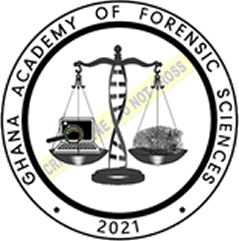
CODE OF ETHICS OF GAFS
FOREWORD
The members of the Ghana Academy of Forensic Sciences, have resolved that certain ethics of conduct are critical for the decent practice and honourable standing of their profession, and that a Code of Ethics, even though not envisioned to embody an obstinate convention of guidelines, is necessary to guide their practice of forensic science, affirm that:
The practice of forensic science necessitates the application of science and scientific procedures with the purpose of providing unbiased and independent evidence to support in the administration of the law.
SECTION 1:
Compliance with the provisions of this Code will in any event confirm a member of the backing of the Academy.
SECTION 2:
Non-cooperation with the provisions of the Code will be viewed as inconsistent with membership of the Academy.
SECTION 3: SCIENTIFIC TECHNIQUES
Clause 1: Established scientific principles and methods ought to be employed except a specific examination necessitates the use of a novel method.
Clause 2: Suitable procedures should be used having regard to the standard of proof that is essential and that can practically be accomplished.
Clause 3: Independence must be always upheld, from when examining scenes and gathering stuffs for advance analysis, to reaching decisions grounded on presented evidence.
Clause 4: Suitable experimental controls should be used and, where appropriate, results confirmed by retesting or by the application of further or alternative methods.
Clause 5: Analyses must not be taken outside the confines of one’s know-how.
Clause 6: Where feasible, the physical results of tests, field notes, test notes, reports and photographs should be retained for as long as probable or at minimum throughout the latitude of any vital legal proceedings.
SECTION 4: REPORTING OF RESULTS
Clause 1: Distinction must be made between results of tests, and examinations and opinions based on these. Any relatable margins to the test results and conclusions should be explained.
Clause 2: Opinions should be articulated in simple, defined and unambiguous expressions.
Clause 3: Where test results or conclusions are capable of being inferred, to the benefit of both sides in a legal trial, each result or conclusion should be given weight according to its merit.
Clause 4: There should be a readiness to acknowledge that other views, being divergent to or inconsistent with one’s own, can decorously be held.
Clause 5: Reference should be made in the report to all items examined or tested.
Clause 6: The nature and character of all tests and examinations should be available to the Court.
Clause 7: Reports will be signed only by personnel who have either carried out the work described or have directly or indirectly supervised it.
SECTION 5: PRE-TRIAL CONDUCT
Clause 1: Every effort should be made to produce the report in ample time before the related legal proceedings to assist appropriate deliberation of it, only if adequate notice of the date of legal proceedings has been acknowledged.
Clause 2: With the understanding that there is no property in expert scientific witnesses, the prospective witness should be reasonably accessible for dialogue with professional agents of all parties involved in the proceedings.
Clause 3: Any retainer presented should be rejected if it is assumed that the purpose of the bid is to foil germane evidence being presented to a Court.
SECTION 6: DEMEANOR IN COURT
Clause 1: As much as plausible, simple terms should be used when giving evidence.
Clause 2: Any effort made to press the witness to testify as to matters beyond and/or outside his/her proficiency should be confidently resisted.
Clause 3: An independent and temperate convention in giving evidence should be cultured.
Clause 4: In the conduct of giving evidence the witness, upon request, is under an obligation to disclose all tests and experiments performed, subject to the directions of the presiding judicial officer.
Clause 5: The witness should plainly state opinions as such and take care to distinguish them from statements of fact.
Clause 6: The witness should petition the court if he or she believes that the mode
in which evidence is being produced is such as to thwart the exposé of a substantial matter or circumstance.
SECTION 7: UNIVERSAL MATTERS
Clause 1: It is right to counsel a lawyer regarding the reports and evidence of other experts even if such assistance could be used in the cross-questioning of that professional. To this end, co-operation in the donation of notes/records should be
given with, if preferred, the condition of open conference and dialogue with the reviewing professional.
Clause 2: Confidential information acknowledged must not be indecorously revealed.
Clause 3: Media association of an expert’s name with specific cases or accomplishments, or association of one’s name with developments, publications or establishments with which that expert played no meaningful role, should be avoided.
Clause 4: Professional and personal behaviour consistent with membership of an expert ought to be observed and contemporaries treated with due reverence and unfitting denigration of them shunned.
Clause 5: No services shall be rendered where the fee is reliant on the result of the analysis.
Clause 6: Inaccuracies or errors learnt preceding, in the course of, or after any hearing should be divulged.
SECTION 8: COUNCIL AND OFFICE HOLDERS
Clause 1: Those elected as Council or Committee Members of the GAFS have the following added responsibilities: To actively avoid voting on, or in any way swaying any resolution where the Member has a private or monetary interest greater than the Members largely.
Clause 2: To immediately state any conflict of interest, genuine or impending, and refrain from decision making in such circumstances.
Clause 3: To keep private all GAFS information as mandated by law or the Constitution.
Clause 4: To ensure that GAFS properties, resources, services and influence are not taken or used for private improvement.
SECTION 9: ACCOUNTABILITY
Clause 1: All queried violations of this Code would be brought to the attention of the Council of the Academy for discussion and may be dealt with by the Council under the Rules and Constitution.